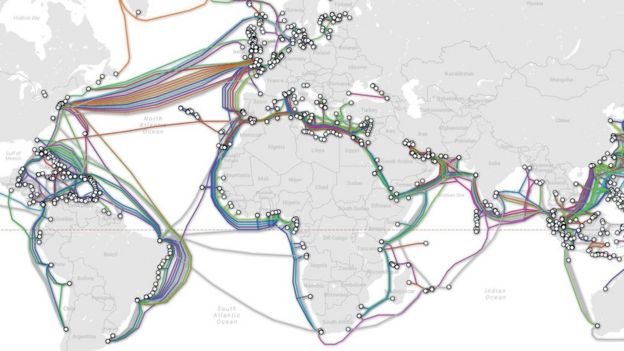Russia a 'risk' to undersea cables, defence chief warns
The UK's most senior military officer has warned of a new threat posed by Russia to communications and internet cables that run under the sea.
Air Chief Marshal Sir Stuart Peach, the chief of the defence staff, said Britain and Nato needed to prioritise protecting the lines of communication.He said it would "immediately and potentially catastrophically" hit the economy if they were cut or disrupted.
The cables criss-cross the seabed, connecting up countries and continents.
According to a recent report for the Policy Exchange think tank, the world's submarine network comprises an estimated 213 independent cable systems and 545,018 miles (877,121 km) of fibre.
But it said a lack of formal state ownership meant cables do not have strong protection in international law.
Despite that, an estimated 97% of global communications and $10 trillion in daily financial transactions are transmitted by cables under the ocean.

"In response to the threat posed by the modernisation of the Russian navy, both nuclear and conventional submarines and ships, we along with our Atlantic allies have prioritised missions and tasks to protect the sea lines of communication," he said.
He said it was "very, very important" to understand how important that mission was for Nato.
"Because Russia in addition to new ships and submarines continues to perfect both unconventional capabilities and information warfare."
The UK and its allies needed to "match and understand Russian fleet modernisation", he added.
Where are the undersea cables?
 Image copyrightTELEGEOGRAPHY
Image copyrightTELEGEOGRAPHY"Can you imagine a scenario where those cables are cut or disrupted, which would immediately and potentially catastrophically affect both our economy and other ways of living."
According to the Policy Exchange report - published earlier this month - many cable systems are potentially at risk.
"Undersea cables are the indispensable infrastructure of our time, essential to our modern life and digital economy, yet they are inadequately protected and highly vulnerable to attack at sea and on land, from both hostile states and terrorists," the report concluded.

Fears of Russia cutting, disrupting or "wire tapping" undersea communication lines are growing.
Defence and intelligence chiefs see not just increased Russian submarine activity, but its willingness to use unconventional asymmetric warfare.
In highlighting this threat, Air Chief Marshall Peach was admitting Britain and its Nato allies were ill-prepared to deal with the prospect of such an attack.
There's been a significant increase in Russian submarine activity in the North Atlantic, particularly the GIUK (Greenland, Iceland and the UK) gap.
Britain certainly doesn't have enough ships, submarines and aircraft to mount a constant watch.
The UK will be getting new maritime patrol aircraft in the next decade, but for now has had to rely on the help of other Nato aircraft to hunt down submarines.
Nato's former top military Chief Admiral Stavridis recently said: "We've allowed this vital infrastructure to grow increasingly vulnerable and this should worry us all."

He said the locations of the cables were "both isolated and publicly available" and a successful attack would be an "existential threat to our security".
Writing a foreword to the document, Admiral James Stavridis, a former US Navy officer and ex-Nato supreme allied commander, said: "It is not satellites in the sky, but pipes on the ocean floor that form the backbone of the world's economy."
He also warned of a potential threat from China and Iran, as well as Russia.
He called for the creation of more "dark cables", to be kept in reserve, and said Nato must be prepared to defend global submarine cables, if necessary.
It comes after a ship dragging its anchor cut three undersea internet cablesconnecting the Channel Islands to the UK last year.
It resulted in slower internet connections and phone problems across the islands.
Comments
Post a Comment